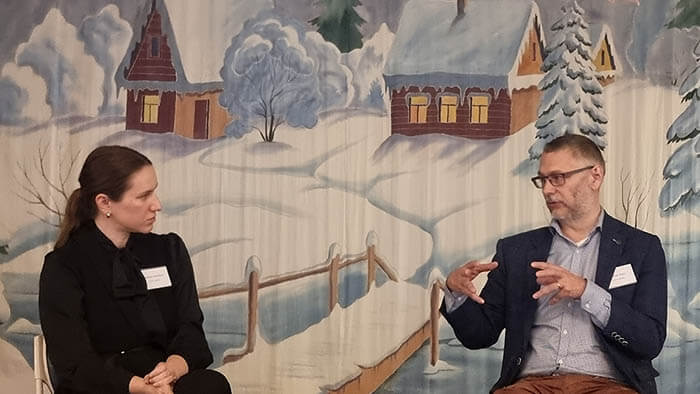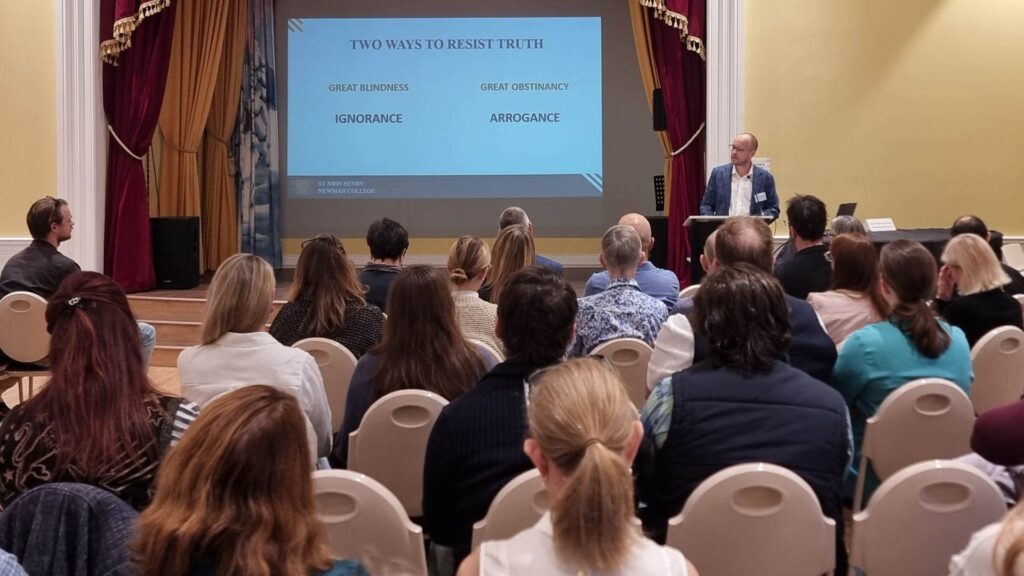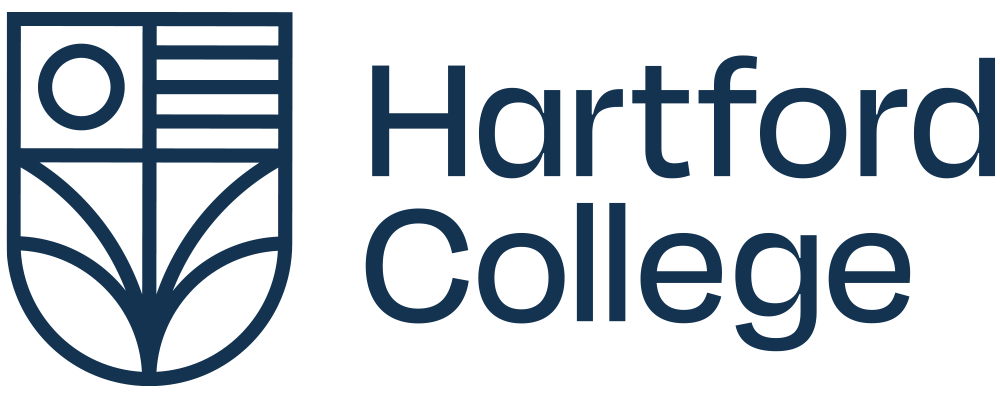Modern Education – A Crisis Four Centuries in the Making
06 June 2024
Modern Education – A Crisis Four Centuries in the Making
06 June 2024
Andrew Kern – CIRCE Institute
Modern Education – A Crisis Four Centuries in the Making
Everyone is interested in education. From the grandmother doing Wordle on her couch to the bloke in the pub with his mates. With good reason. Today, if we get education wrong, it disaffects our children, their future and the society they contribute to. Plus, many will say, a plethora of downstream dystopian consequences ensue.
Being a founding parent of Hartford College, I pay attention to the rising crescendo of commentary on schooling. Despite the billions thrown at education, the noise grows louder.
Some opine that the problem has been around since the 1960s. That revolutionary decade brought forward child centred learning with gusto. Grammar, Latin, Logic and Socrates got turfed to the dustbin.
Experts say the origin of the debate is more than a century old. For a hundred years, progressives and traditionalists have been at ten paces in a duel to the death.
Andrew Kern, founder of the CIRCE Institute, goes bigger. He says the problem has been four centuries in the making – since the Renaissance.
Speaking at the first Classical Education Australia conference in Brisbane on Saturday 1 June, Mr Kern addressed over 100 teachers, parents, school board members and administrators. His speaking tour continues this week in Melbourne and Sydney. Participation is still available.
Andrew Kern is a leader in the classically inspired education movement reverberating through the United States. The movement is big. Hundreds of schools follow variations of the model including the Chesterton Schools Network, the Association of Classical Christian Schools, the Institute for Catholic Liberal Education, the Society for Classical Learning, charter schools, and many notable independents. Most have a religious ethos at their core – some are entirely secular.
Kern says researching, teaching, and consulting to schools for over 30 years has been immensely fulfilling – he describes the renewal that the souls of children enjoy by feeding on the true, good and the beautiful. He pays immense credit to heroic parents who are fueling the revival. Especially, the mothers and teachers struggling day after day fighting for the students they teach. With humility, he says the Lord will be impressed by them, less so by the people who get up and speak about it publicly.
Amusingly, after all his years of experience he says the key to being a good teacher is not knowing anything. Then the students will reveal what they know. He referred to the Socratic method which he demonstrated with his daughter/teacher Katerina Hamilton (see photo below).

Andrew Kern and Katerina Hamilton demonstrating the Socratic method
In a fascinating summation of where we have got to, Kern says one of the cruellest things for children is to grow up not knowing they are infinite souls. Teachers must be more attentive, to what their pupils actually want. There was a time when having a soul was taken for granted. The classics are a form of soul food.
The ancients believed in the world as a gift, full of meaning, a manifestation of the outward love of God. To behold a tree is communicating with the eternal love of God.
Shakespeare’s Hamlet was written around 1600. The time of the Copernican revolution, the Tudors and the Reformation. Hamlet is one of the greatest heroes – the first ‘modern man’. He preserves the monarchy, but he has no ground to stand on. Everything is uncertainty. What is he telling us about our age?
Matthew Arnold writing in the 1800s referred to the sea of faith drawing out to sea. By the 1920s, after World War I when the West did its best to kill itself, WB Yeats wrote ‘mere anarchy is loosed upon the world’ (The Second Coming).
Kern says we are now living in the transition stage. The forces that have been let loose are reaping their exhausted harvest. Europe, for example, has lost the will to be Europe. For those educating the next generations, the future belongs to those who turn up for it.
400 years ago, citizens believed in a designed cosmos (the word’s origin is the same as for cosmetic). Now we begin in chaos. In a world of chaos we’ll take anything we can. The contemporary mantra is ‘trust the science’, a vacuous statement. The whole point of science is to not trust things until you’ve tested them exhaustively. Disruptors occur. Swans were always white - until Western Australia was discovered.
400 years ago, the cosmos started morphing into a machine, then became chaos. Hence, the modern mind is desperate, in agony. We are all cultivated in this modern mind. We all inherited this discord.
Quoting St John Henry Newman, part of the unity of this world is its harmony. To see the harmony our eyes must be clear. Hence, virtue is integral to learning. If the eye is full of darkness, how dark is the world around it. It takes virtue to see it. Descartes commenced the veering away from virtue to method. But the teaching of virtue is not a method. It’s not scientific.
In the noble cosmos of the middle ages, the liberal arts sought to discover God’s majestic humility in his creation. Knowledge was not divided up into ‘subjects’. Subjects that authorities can change at their whim. We employ subjects to manage the chaos that consumes us. But we ought be learning how to dance with the world. Rooted in the love of wisdom and virtue is a love of human nature. We have to nourish the soul for this. This doesn’t require methods – it requires food for the soul.
Intelligence is the ability to read the innerness of something. Modern understanding doesn’t acknowledge the innerness of something. We don’t have souls. We just have minds that sit outside things - to enable us to adapt to the environment. Adapting is good but its not knowledge.
Andrew Kern is all about rejuvenation in education. He is not elitist, but is striving to offer a complete education to those who wish it. Nor is he advocating rebellion: ‘We need to submit to every human ordnance’. The current movement won’t reach everyone but those with a classically inspired education will be better educated. Human history bears out an ever-present disparity between the better educated and the less educated.
Too often the modern curriculum is fragmented, harmful, and driven by debatable scientific assertions. The solution is harmony, the liberal arts, and a timeless understanding of humanity.
Other speakers at the conference included Difff Crowther, Principal of the St John Henry Newman College scheduled to open in Brisbane in 2026, Dr David Daintree AM from the Christopher Dawson Centre for Cultural Studies, and Sarah Flynn of Logos Australis.
Difff Crowther said education that is only for political or practical utility is not enough. He asked how we know if education is good? We know, if it fulfils human purpose. Quoting St John Henry Newman, its purpose is the enlargement or perfection of the intellect.

Diff Crowther addressing the Brisbane conference
A truly Catholic liberal arts school teaches that faith and reason are not enemies. Knowledge and reason are interwoven with faith. Whilst utility, vocation and usefulness are vitally important, education should not only seek these outcomes. Contemporary education is filled with what is useful – a utility driven mindset. Newman said that ‘though the useful is not always good the good is always useful’.
Difff said if knowledge is just a means to power, ‘we throw ourselves back on ourselves’. Knowledge does lead to power, but if that is our goal we will not achieve it. Rather, education must strive for harmony. For the integration of reality. Converse to scientism, that seeks to pull things apart, a Catholic liberal arts education leads to appreciating the overarching unity in God’s creation.
Australia will be the beneficiary of this harmony in education. An education that forms an integrated view of the world leads to integrated harmonious individuals with many downstream effects: integrated harmonious families who form integrated harmonious communities.
Dr Daintree said the study of Latin provides a breadth of vision. Paradoxically, this is so important today. The mushrooming of knowledge has forced specialisation which has become an end in itself. It excludes anything outside of the specialty.
The time has arrived where students doing English have never studied Shakespeare – in a post-modernist culture, Shakespeare is as equally important as TikTok. There is no truth, and no author is better than another.
A reborn classically inspired educational movement is not a restoration but a renovation of what was good in the classics – recovering, rebuilding, reassessing, and reformulating.
Sarah Flynn referred to the drop in literacy standards in Australia that has been well documented. In 2023, the majority of year 9 students were tested as reading at year 7 level.
The current revival is directed towards a mode of knowledge that credits poetic knowledge – it evokes a love of the harmony and order of the universe – the created world is metaphorical of God as our Creator.
Proponents of the classical education movement are fire starters. We have to remember what its like to light a fire from nothing. It takes effort to keep the fires burning.
Hartford College is not a classical education school in the strict sense of the word. It does claim to have a classically inspired liberal arts curriculum in the Catholic intellectual tradition. Hence, my interest in the classical education movement and Andrew Kern’s current speaking tour.
At this moment, we are well served and grateful to learn from our American friends in their journey through a complex and challenging educational landscape. It is an important relationship.
Hartford is part of the discussion. Last year, we hosted Dr Karen Bohlin from Massachusetts at our annual symposium. This year on All Saints Day, 1 November, we look forward to hosting Dale Ahlquist, President of the American Chesterton Society and founder of the Chesterton Schools Network. Next year, in May 2025, we will host Joseph Pearce, author and literary scholar from South Carolina.
Long may the conversation continue.
Tim Mitchell
Chair
Hartford College

Daceyville
NSW 2032
(02) 9184 8840
Hartford Policies

